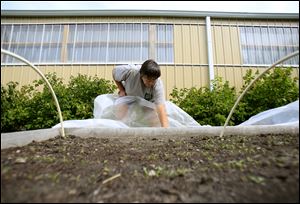
EDITORIAL
Giving urban agriculture a boost
11/17/2017

Sister Rita Wienken demonstrates using hoops and covering over her carrots at Toledo GROWS.
The urban-agriculture initiatives sprouting up in Toledo neighborhoods ought to be nurtured by supportive policies and other assistance at every level of government. So far, local leaders have been disappointingly slow to embrace the practice, so a proposal from U.S. Rep. Marcy Kaptur (D., Toledo) to provide more federal assistance is welcome news.
Click here to view more Blade editorials
As Miss Kaptur points out in her proposal for Urban Agriculture Production Act of 2017, city farming helps boost local food production and gets fresh, nutritious produce into city neighborhoods where it might otherwise be lacking.
The popular grassroots effort to convert unused city spaces into verdant small-scale farming operations addresses several issues particularly troubling in Toledo, including blight and neighborhood development. Community gardens can bring neighbors together and reclaim vacant lots that otherwise become magnets for litter, graffiti, and other ugliness.
Unfortunately, Toledo officials are behind the curve on urban farming. Toledo is more likely to throw up obstacles for residents seeking to transform unused space into small-scale agricultural operations than it is to offer assistance. Just ask Thomas Jackson, the urban farmer who wound up in municipal court over disputes with the city about his farming.
But Mr. Jackson is just one of quite a few operations blossoming despite neglect, if not outright resistance, from city authorities. The city has a growing number of small-scale agriculture enterprises. And Toledo Grows, the horticulture program, helps city farmers with community gardens, including the urban farm campus on Oneida Street near downtown.
Now Miss Kaptur, whose parents operated a family market, has offered a bill that would lend the support of federal agencies for city farmers.
Miss Kaptur’s bill would establish an urban agriculture liaison and outreach program at the U.S. Department of Agriculture to advocate for urban farming. The bill also would create competitive grants and loans to advance agriculture in cities.
Encouragement and financial assistance are the types of policies every level of government should have for urban agriculture. Congress should approve Miss Kaptur’s bill and state and local officials should be inspired to create their own complementary legislation.